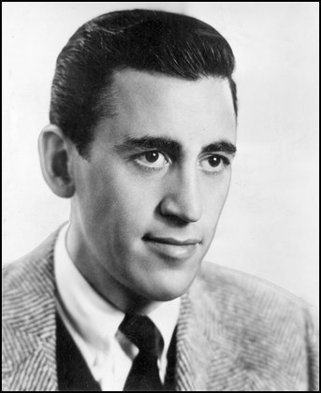
In my Introduction to Literature classes, I used to poll my students about the books they had read in high school that had impacted them. One book above all made it to the top of list after list: J. D. Salinger’s Catcher in the Rye. I mention this because Salinger died yesterday at age 91.
Catcher in the Rye was an important book for me but not because it was one of my favorites. In fact, I hated it when I encountered it in a sophomore high school English class. I have discovered, however, that there is as much to be learned from a book that one hates as from a book that one loves. Here is a slightly adapted post of mine about it, from September 10, 2009:
I was assigned Catcher in the Rye by Bill Goldfinch, my sophomore English teacher at the Sewanee Military Academy. Many of the other students, far less interested in literature than I was, loved it. But I felt sullied by it.
While I detested it, however, I still vividly remember certain scenes. I remember Holden Caulfield’s acne-pocked roommate (or maybe it’s a student down the hall). I remember fellow students acting up in a student assembly. I remember his history teacher picking his nose while pretending not to. I remember Holden wearing a hunter’s cap and calling everyone a phony.
Above all I remember his trip to New York, which terrified me. I felt as though he was entering a war zone. I found particularly unpleasant the run-in he has with a prostitute and her pimp.
Upon reflection, I realize that what I disliked about Holden is what I disliked about myself as an adolescent. Holden is self-conscious and feels like an outsider. He is judgmental towards others but at the same time he wants to belong. He is simultaneously critical and envious of jocks. He doesn’t like himself. Nothing ever feels stable.
There were other similarities with my situation. Holden goes to a college prep boarding school, as did I. Unlike Holden, however, I was a day student, and I felt as though I wasn’t as mature as the boarders. After all, I was still living with my family. I therefore felt threatened by Holden going to New York. It felt like the stories I would hear from my fellow students about going to parties in Nashville or Chattanooga or visiting the Playboy club. I felt like an innocent.
I think I found the scene with the pimp and the prostitute distressing because of all my ambivalence about sex. It captured the way sex seemed alluring and forbidden and dirty all at once. Salinger contributes to the effect by setting the scene in a city hotel room, a threatening environment for a reader from small town Tennessee.
In short, the book reminded me of my inadequacies. Other students may have loved it because it gave them a voice to their frustrations. But I wanted to escape this world, blamed Catcher in the Rye for shoving my reality in my face, and escaped into fantasy literature, above all Lord of the Rings.
As I think about it, Tolkien’s book is in many ways a reaction against the loss of innocence. At the end, the age of magic comes to a close as the elves leave Middle-earth. Humans have to step up and begin governing.
Interestingly enough, I wasn’t really misreading Catcher in the Rye. My trauma is Holden’s trauma as well. After all, he longs for the innocence of his little sister, which gives the book its title:
“Anyway, I keep picturing all these little kids playing some game in this big field of rye and all. Thousands of little kids, and nobody’s around – nobody big, I mean – except me. And I’m standing on the edge of some crazy cliff. What I have to do, I have to catch everybody if they start to go over the cliff – I mean if they’re running and they don’t look where they’re going I have to come out from somewhere and catch them. That’s all I do all day. I’d just be the catcher in the rye and all. I know it’s crazy, but that’s the only thing I’d really like to be.”
Holden may think he’s talking about Phoebe, but he’s also talking about himself. He feels that he too is a kid who is running off the cliff and he wants someone to catch him as well. He thinks he’s all alone, living without a net. So do most adolescents. So did I.
Addendum: My son Toby, who worked for a Baltimore tutoring center for a year, says that Catcher in the Rye remains a polarizing work among high schoolers. He says he could always predict which students would love it (the theater-loving, angsty, self-searching, creative students) and which would hate it (the athletes, the “populars”). I saw some of that same dynamic with my college students.
And here are a couple of pieces of trivia. According to NPR last night, 60 million copies of Catcher in the Rye have been sold. And my English department chair when I was a Fulbright scholar at the University of Ljubljana in Slovenia (Meta Grosman) made Catcher in the Rye required reading for all senior high school English classes in the country.